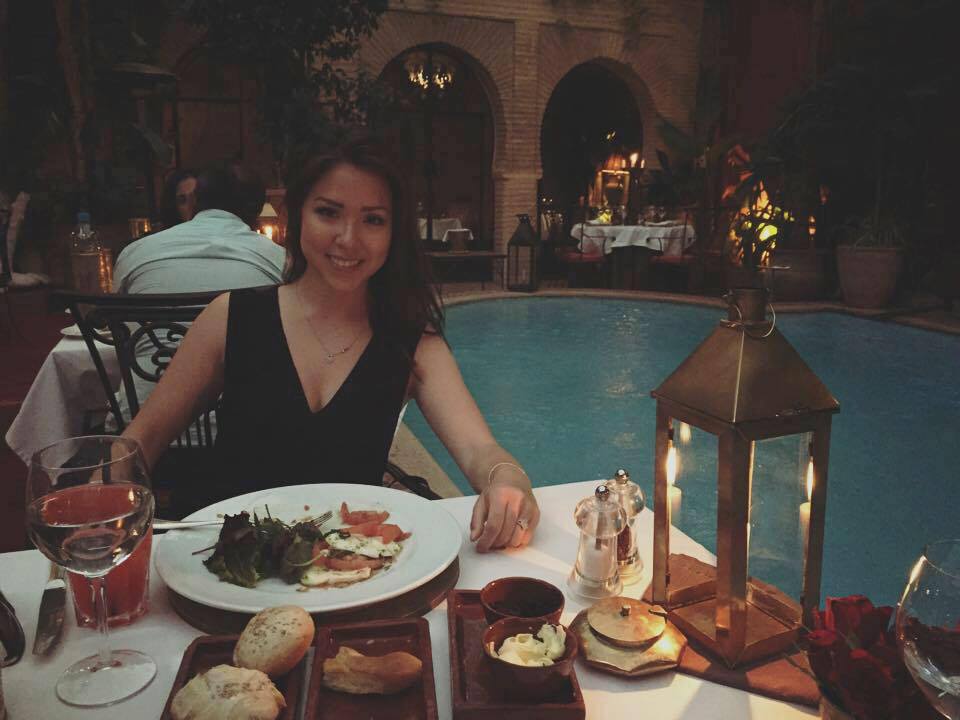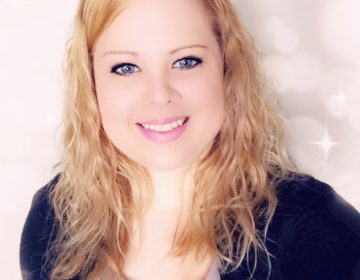
Sarah Kikuchi
A little bit about you:
Name: Sarah Kikuchi
Age: 28
City: Halifax, NS
What was your diagnosis? Acute Lymphoblastic Leukemia (ALL)
What year was it? What was your age at the time?
2018, 27-years-old.
What is something you’ve done that you’re really proud of?
Continued my master’s degree through treatment.
What are your hobbies?
Travel, art, writing.
Your diagnosis:
What was your life like before your diagnosis?
I’m an elementary school teacher (French Immersion). My husband and I had just bought our first house a year before my diagnosis after living in Morocco for a few years.
How did you find out you were sick? What led to your diagnosis?
I wasn’t feeling well for several weeks last June/July. I was nauseated and fatigued, I had pain in my hip, I would get out of breath doing simple things like going up stairs, and I had headaches, but I attributed it all to stress and from not being to the gym in a couple months. I ended up in the emergency room after fainting at the end of July, breaking my ribs and puncturing my lung in the process.
My blood work showed strange levels for my age so the ER doctors said hematology would be contacting me with an appointment for further blood work, etc. I went home for a couple of days with a lot of rib pain.
My family doctor called due to concern about the blood work, and was appalled that I did not yet have an appointment with hematology. He then called the hospital himself and arranged for them to contact me. I went in the same day for more blood work and to see a doctor on the hematology floor. They said they’d contact me with the next steps after they got the results.
That evening, I got a call saying I would need to come to the hospital the next day for a bone marrow biopsy. I should bring things to stay overnight. Not knowing anything about cancer or bone marrow biopsies, I had no idea why you would get the biopsy or what it meant. This was probably for the best because I was already quite nervous about the procedure (the name itself sounded bad).
A few hours after the biopsy, one of the hematology doctors came to explain the diagnosis.Fun fact: When I was in the hospital, I received a letter from the hematology department giving me an initial blood work appointment at the end of August. If my family doctor had not advocated for me, I would have waited another month (the same amount of time I was in the hospital) just to get diagnosed.
What did your treatment consist of?
I’m on the Dana Farber Protocol for ALL. I was in-patient for the first month of treatment (induction), which was a very intense phase. It didn’t help that it was July and August and the floor I was on had no AC. This phase consisted of chemo, steroids, and lumbar punctures. I also had a variety of X-rays, CT scans, MRIs, ultrasounds, etc.
The next phase was the central nervous system (CNS) phase. It only lasted a couple weeks and consisted of eight rounds of brain radiation, multiple lumbar punctures, and chemotherapy.
The next phase was intensification, which was difficult because it felt so long (7 months) and the steroids were so hard on my body. I tolerated the oral and IV chemotherapy fairly well.
I’m currently in the final phase called continuation. This phase will be around a year and a half and consists of IV chemo, oral chemo, and steroids. It also includes lumbar punctures every 16 or 18 weeks.
The first six months was very physically and emotionally difficult, but now this life (appointments, treatment, strange appearance) has become the “new normal.” I’m still very much looking forward to getting back to the old normal, though.
Life after cancer:
How is life different for you now post-diagnosis?
I definitely have a new perspective on life. I have new priorities and a better sense of what’s important to me. However, I did think this would make me a “better” person (more patient, kind, and understanding). That hasn’t really happened yet (haha).
What is the toughest part about having cancer as a young adult?
Probable infertility, managing relationships, and changes in my appearance.
What really helps you to keep going?
Spending time (or just chatting) with friends and family, music, Netflix, continuing my studies, and cooking. Oh — and humour!
What kept you busy during treatment?
My master’s degree, writing a blog, spending time with family and friends, watching Netflix, decorating my house, and cooking. I’ve recently started to do some light exercise. I’m hoping to start another graduate program after I finish my master’s this summer (2019) as I won’t be able to work for at least another year or two.
*Update: I finished my master’s degree in education in the summer and enrolled in and began a Visual Arts program (for teachers) at the Nova Scotia College of Art and Design this fall (2019). I also have an upcoming hip replacement surgery in early 2020 (I have AVN due to steroid use), so I’m sure I’ll be busy with that in the upcoming months, haha.*
How are you connected with Young Adult Cancer Canada?
A parent of one of my past students told me about YACC.
The issues:
Do you feel isolated from your peers since your diagnosis? If so, how does that affect you?
I don’t usually feel too isolated as my friends and family are so amazing, though I know at times I am not taking part in typical activities people my age do. I’d like to go out for drinks or go to parties, work out, work, etc.
Did anyone talk to you about fertility options before treatment? If so, how did that affect your decisions? If not, what do you wish you had known?
I was told because of how quickly ALL moves there was not enough time to do anything like freeze my eggs, so there weren’t really any decisions to be made regarding fertility. A doctor from a reproduction clinic ended up coming to talk to me about one option when I first began my treatment. He said that Lupron injections could possibly help me preserve my eggs by putting me into medical menopause. There isn’t a high chance that this will even work but I figure it’s better than doing nothing, so I did decide to get the monthly injections.
Has your cancer diagnosis affected any of the relationships in your life? If so, how, and how are you managing them?
Absolutely. To be continued.
How has your cancer experience affected your body image, and your relationship to your body?
I so wish I had appreciated my body and appearance more before all of this. Now that I have lost my hair, gained weight, lost muscle, and am often swollen and puffy (unrecognizable, really) from steroids I don’t feel like myself at all. This is part of the reason I have started exercising. I can’t wait to get back to how I looked and felt before. Body image and appearance might be the hardest part of all this for me.
What are some lifestyle changes you’ve made since your diagnosis?
I used to eat pretty well anyway, but I have learned to eat many more kinds of veggies! I love cooking now and try to make very healthy meals.
Resources and recommendations:
What would you add to a treatment-day playlist?
Lots of rap and hip hop!
Which books/movies/podcasts/TV shows/etc. would you recommend?
Things that kept me busy/happy or were recommended to me during this time and some old favourites.
Books: It’s Okay to Laugh (Crying Is Cool, Too) by Nora McInerny, Educated by Tara Westover, the His Dark Materials series, Harry Potter.
Movies: Lord of the Rings, Harry Potter, The Grand Seduction, Eighth Grade, Oceans 11, Someone Great, Les Intouchables, any Studio Ghibli movie, Star Wars, Slumdog Millionaire.
Podcasts: 3 Girls 1 Keith, Sickboy Podcast, Office Ladies.
What are your favourite blogs and websites for passing the time?
Wait But Why, Edutopia, Cult of Pedagogy, TED, and my own blog, That’s ALL, Folks.
Have you participated in any other retreats, conferences, programs, or support groups you’d like your cancer peers to know about?
I took part in a “Look Good, Feel Better” workshop, which was nice.
Stay in touch:
What would you like to say to other young adults dealing with cancer who are reading this profile?
Things in the beginning of all of this were so difficult. I did not want to talk to anyone, do anything, or even watch anything. I was definitely depressed, but didn’t know it, and just stayed on my couch staring into space for months. It’s ok if you’re at that point. Just know that it does get better and easier. And know that there is an entire world of people who, when you’re ready, are waiting to talk/listen/share/meet up, etc.
Are you interested in helping others facing cancer challenges? Sure!
Instagram: @sarahmkikuchi
Blog: https://sarahmkikuchi.wixsite.com/thatsall
[Editor’s note: If you are interested in getting in touch with Sarah, email [email protected] and we will forward a message to her.]








